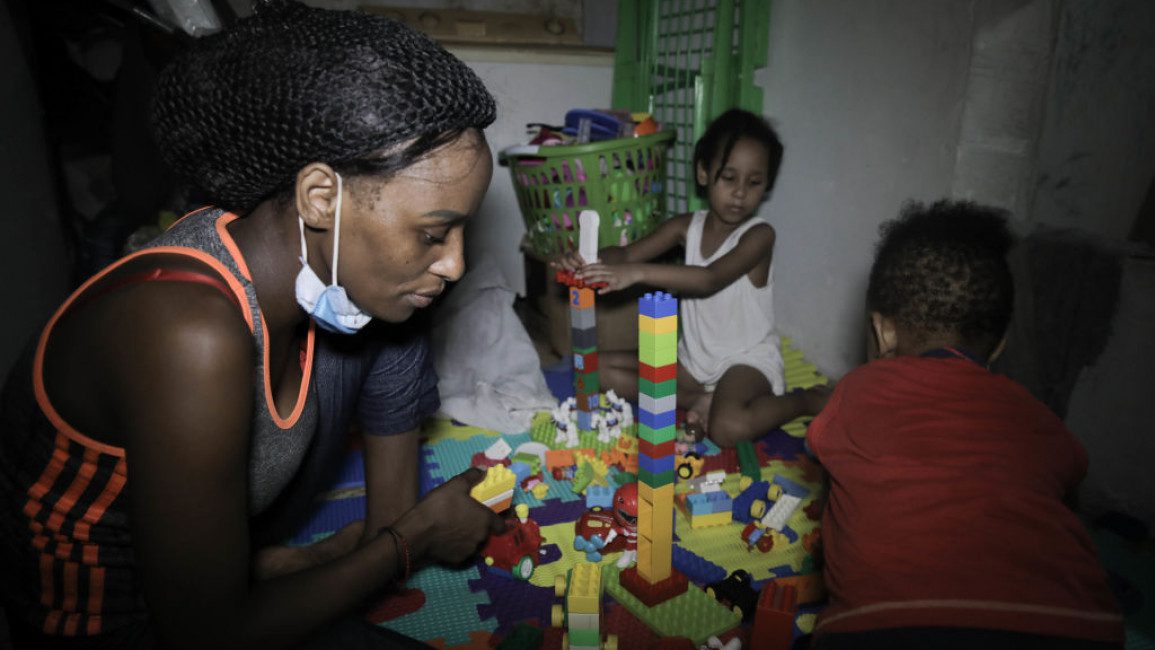Lebanon’s kafala system continues to ensure an underclass of migrant workers remains unheard of in the national debate. The country’s economic crisis has hit this community particularly hard, with many unable to afford necessities like the internet.
The Lebanese kafala system, the primary sponsorship network for migrant domestic workers, has faced continuous backlash from various NGOs and humanitarian groups for its oppressive and inhumane structure.
Under kafala, employers can exert total control over their employees and legally deny them access to social and economic support.
They also reserve the right to withhold passports and workers must receive written permission from them to be able to leave the country.
“Kafala workers are excluded from Lebanese labour laws and therefore cannot be protected by the state or the judiciary system”
According to the United Nations, of the approximate 250,000 migrant workers that Lebanon hosts, the vast majority originate from sub-Saharan and Southeast Asian backgrounds.
Given Lebanon’s problematic attitudes towards race, embedded racial slurs and deep-rooted colourism, this predominantly female POC workforce often faces verbal, physical and mental abuse at the hands of their sponsors with no access to legal representation.
In addition, many Lebanese place a higher value on Asian workers, making African women more exposed, vulnerable, and financially insecure. Kafala workers are excluded from Lebanese labour laws and therefore cannot be protected by the state or the judiciary system.
With Lebanon’s currency losing 95% of its total value, many migrant workers struggle to tread water as food, electricity and transport costs have risen approximately elevenfold.
These migrant women are therefore left isolated and fearful as they try to survive by committing themselves to unstable, insecure, and often dangerous freelance domestic work.
COVID-19 further compounded these feelings of isolation, desperation and financial insecurity as lockdowns prompted the immediate closing of airports.
This meant migrant women were forced to stay with their employers for free, often making them subject to physical, sexual, and mental abuse with no legal protection.
The financial crisis has not only caused food and transport rates to skyrocket, but telecom operators recently announced that internet costs would rise by double.
As a result, these women will no longer have access to Wi-Fi and phone calls to source employment. Rising sim card prices have meant that domestic workers cannot only not afford to pay their phone bills, but activist groups and NGOs are also unable to contact them to provide food, medicine, and clothing.
Speaking to Patricia Pradhan from the domestic worker protection project This Is Lebanon, she notes that “domestic workers are barely surviving, living in appalling conditions. Most can only dream about sending money home. Some have turned to survival sex just to pay the rent and eat.”
Patricia highlights how precarious, and vulnerable, these women’s living situations have become as a direct result of their inability to access the internet and use their mobile phones freely.
This Is Lebanon deals predominantly with workers living under contract, whose access to the internet has always been limited.
However, activist groups claim that internet bills have increased by four times in some cases which have been devastating for those already facing hardship.
Since the crisis, many employers have turned their domestic workers to the streets with no support as their monthly wage of $150-$400 became too expensive.
Pre-crisis, the Lebanese telecom sector received consistent accusations of corruption given that it was a major source of revenue for the state.
According to the most recent Lebanese Court of Audit April report, it was estimated that $6 billion dollars in expenses were registered under the major telecom firms between 2010 and 2020.
With a lack of transparency on how, where and when this money was spent many have blamed this frivolous and mismanaged spending for the drastic and disproportionate increase in telecom rates costing the Lebanese people, especially domestic workers, their livelihood.
“The [Lebanese] government can continue to profit off unregulated domestic labour with little public outcry. In addition, security forces are un-cooperative and unwilling to escalate cases of abuse, neglect, or poverty”
Lebanon has also struggled to import sufficient fuel to power the transmitter stations, resulting in nationwide coverage outages throughout 2021.
Consequently, Lebanon’s cabinet has tried to mitigate the impact by calculating tariffs according to the Sayrafa platform’s flexible currency rate, which is much weaker and, therefore, more expensive for customers.
Given that migrant workers relied heavily on the internet to buy plane tickets to leave abusive employers and contact shelters for food, guidance, and legal support they are no longer able to escape hellish conditions as everything has become unaffordable.

